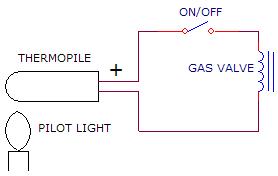The thermopile in your fireplace puts out millivolts, nothing near the 120V the light switch was designed for. It's probably just a matter of finding a switch with a low enough on resistance. A generic low voltage switch from a electronics store, or ripped out of a toy, would probably do it (for example a 12V SPST). Really here the smaller the better, but beware of anything too cheap as that may put you down the wrong path again.

There are some fireplace specific forums which could help, particularly with a model number given. An example is http://www.hearth.com/talk/ . The above image is from "Discover Circuits Magazine (December 2009 Issue 4)", which has a guide on this exact topic along with a clever booster solution from one "Mr. Wily Widget". Find it over at http://www.discovercircuits.com/dc-mag/Issue_4/pg-7.htm
You can also try cleaning the thermopile which may have crust of soot. Measuring Measure the voltage between those two exposed wires to see if your cleaning makes an improvement.
